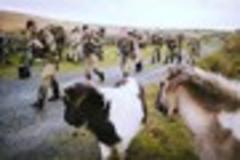 This is Cornwall --
This is Cornwall --It's the crack of dawn and still dark outside when 50 Royal Marines recruits set off across Dartmoor, 32 weeks of gruelling training behind them, a 30-mile speed march and their green berets ahead of them.
Today is the day of reckoning for these young men: their futures hinge on getting through the next eight hours, the final Commando test.
"This test is more about mental robustness than physical," says Lieutenant Colonel Mike Geldard, Commanding Officer of the Commando Training Wing at the first checkpoint 12 miles in. "It's testing those who can replace 'can't' with 'can'.
"From about mile 12, they're running on determination."
The Royal Marines are part of the UK's "high readiness force" which means they are often the first troops to be deployed and required to operate a long way from logistical support.
"We need to know they're not going to give up," continues Lt Col Geldard.
The test dates back to the Second World War, when the marines conducted commando raids in occupied Europe. The concept itself dates back further, and is inspired by African Zulu warriors who were fit to fight after running for many miles.
"Every single one of the recruits will have gone through 31 weeks of training, or longer due to injury or professional setbacks," the Commanding Officer continues. "So it's taken an extraordinary effort to get here – the hardest thing they'll have ever done in their lives.
"They'll have done a lot of previous exercises that involve yomping and carrying full field kit – this is done progressively with mileage increased from four to 12 miles.
"When they come to do the 30 miles they won't be carrying as much weight so they'll feel lighter.
"Mental fortitude is what gets them through the extra distance."
The recruits today are split into four syndicates led by their section corporals. They have all received a safety briefing and motivational pep talk before setting off from Okehampton Camp on a mixture of tracks and open moorland at an average of four miles per hour, to a location near Plymouth Airport.
Between them they carry their "safety stores" or emergency kit. Each is bearing a weight of around 40lb.
They constantly refuel throughout and then at each of the four major checkpoints, where there are medics on hand, they take a litre of fluid as well as extra sustenance to keep their glucose levels up.
How long it takes them is weather dependent; the chief of staff expects today's 50 to finish around 15 minutes inside the eight-hour deadline.
"It's a team effort, so they go at the speed of the slowest," he says. "But they are expected to support each other."
This, he says, is the essence of the Commando spirit.
At the end of the feat, the finale of their training, recruits who have passed all tests will be presented with their green berets, a symbolic moment ahead of the official ceremony at the King's Squad Parade ten days later.
But the sheer challenge of the Commando tests is not just about the test days themselves, but being able to complete them after what's come before.
The 30-mile speed march comes after the three other Commando tests: the Tarzan assault course, the nine-mile speed march and the endurance course.
The recruits enter the "test phase" in week 26 of their training – however, in the weeks leading up, recruits go on a final exercise which involves long and arduous "confirmatory" activities on Dartmoor, Plymouth and Bodmin Moor.
It takes eight to ten days, and is supposed to consolidate all the skills they've learned.
This is immediately followed by two weeks of live firing, living out on the ranges.
"This is demanding," continues Lt Col Geldard. "They don't get much sleep. They'll be shattered at the end. Purposefully so.
"It's about being able to complete the tests when they're at their lowest ebb – because if they've been there and got through it, they'll know they can go there again. They know they've got the mental and physical resilience to cope.
"A key aspect of what makes Royal Marines different is that we recruit very bright individuals, so they are able to make intelligent decisions when they're tired," he goes on. He also explains how most people faced with danger will automatically launch an aggressive defence.
"But there's a difference between harassing fire and fighting fire that will kill you," he says.
"Often the bravest thing to do is being able to show courageous restraint and do nothing. It takes a courageous man to do that. We test all of this during the Commando test phase." Reported by This is 26 minutes ago.